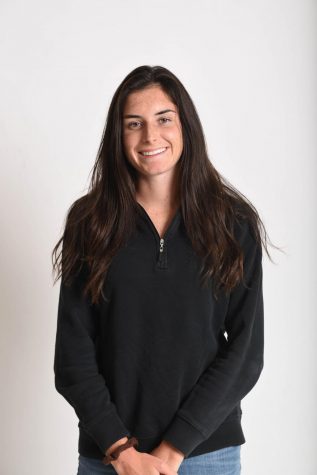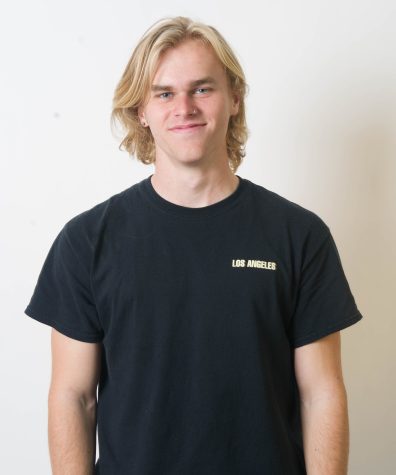First responders
Rosenthal and Bolt train to become EMTs
 Photo by Jarrah May
Photo by Jarrah May
Thirty-five to 50 hours of their lives are dedicated per week to saving lives and helping others in our community. Seniors Noah Rosenthal and Jake Bolt are training as EMTs, or Emergency Medical Technicians.
EMTs are trained to respond quickly to emergency situations involving medical issues, traumatic injuries and accident scenes. They are responsible for basic life support for bodies in critical condition until they reach the hospital.
As EMTs in training, the seniors go on ride-alongs, assist their preceptors with activities and attend an EMT class four days a week.
During these ride-alongs, Bolt and Rosenthal are paired up with a fully trained adult who they help with any activities that are needed. Mainly, they take vitals and ensure the patient’s blood pressure doesn’t stagnate or go too high or too low. If something goes awry, the trainees alert the paramedics.
“I really enjoy running through the scenario in my head of what I would do if I was in charge, then I can watch a fully trained EMT do it and test myself against what they do.” Rosenthal said.
Bolt has learned how to use his training to provide the best care for your patient.
“I just treat my patients with what I can and what I’ve been trained, like CPR, oxygen, bandaging etc. in order to best help them.” Bolt said.
To pass their class, they must have 10 patient contacts and at least 36 hours on ride-alongs. In order to do this, they volunteer with McCormick, an ambulance company that takes the 9-1-1 calls for the Torrance area, and Liberty, which transports patients from one medical to facility to another.
“With McCormick, I play a much more passive role where I mostly observe the paramedics and EMTs work,” Rosenthal said. “But at Liberty, I’ll help with takings vitals, carrying the patients and doing the assessment.”
The seniors are taking the 17-week EMT course at Southern California Regional Occupation Center, where they learn and practice skills such as CPR, airway management, basic trauma care and treating injuries like broken bones, cuts and burns.
“I feel useful and good knowing that if something happened, I would be able to help.” Rosenthal said.
Rosenthal works for about 5 hours a day and about 12-16 hours on the weekend.
“I’ve definitely had to make some sacrifices with my normal high school classes to make sure I’m at my best for EMT. This and high school don’t leave much room for free time,” Bolt said.
According to Rosenthal, EMT is the hardest class he has ever taken in his life.
“We have to do a good portion of the learning outside of class by reading the textbook and doing the workbook,” Rosenthal said.
Rosenthal applied because of his love for helping others.
“I’ve just always enjoyed helping people, so I looked to medicine as my way to do that,” Rosenthal said. “I’ve always wanted to do hands-on medicine for my career choice, and I thought that this class would be perfect.”
Bolt wanted to get into EMT because of his ability to perform well under stress and to see if medicine is something that he was interested in pursuing.
“I’ve had an interest in medicine for a long time, and my aunt, an ER doctor, said that this would be a good way to figure out if it was something I really wanted to do.” Bolt said. “I like doing something on my feet, and I don’t think that I could be trapped behind a desk all day. EMT seemed like a pretty good compromise to get my feet wet in that field without going to med school or anything too crazy.”
Weekly, they are in an ambulance with people whose lives are endangered.
“To know that you are doing something that is truly helping someone in their hour of need is quite the feeling,” Bolt said. “I’m constantly asking myself what I could be doing better in the moment or what I could be doing to prepare for whatever comes next.”
So far, Bolt has enjoyed his experience in the EMT class and volunteering with McCormick and Liberty.
“I haven’t been on too many crazy calls yet. Mainly psychiatric is what I’ve done,” Bolt said. “I’ll have to do more of the trauma side of it and 9-1-1 calls to really make up my mind about it, but right now I’m leaning toward yes [about pursuing medicine].”
Rosenthal feels “fulfilled” and Bolt feels “good” helping people using their skills out in the field. Both plan on working part-time as EMTs in college and hope to become a physician’s assistant as a career.
“I recommend people try EMT if they have an interest in medicine because it’s a good way to test the waters,” Bolt said. “It makes me feel like I’m doing something worthwhile with my time.”

I was a writer my first 2 years of Journalism and now I'm a news editor. Outside of school I play soccer and do Mock Trial.



